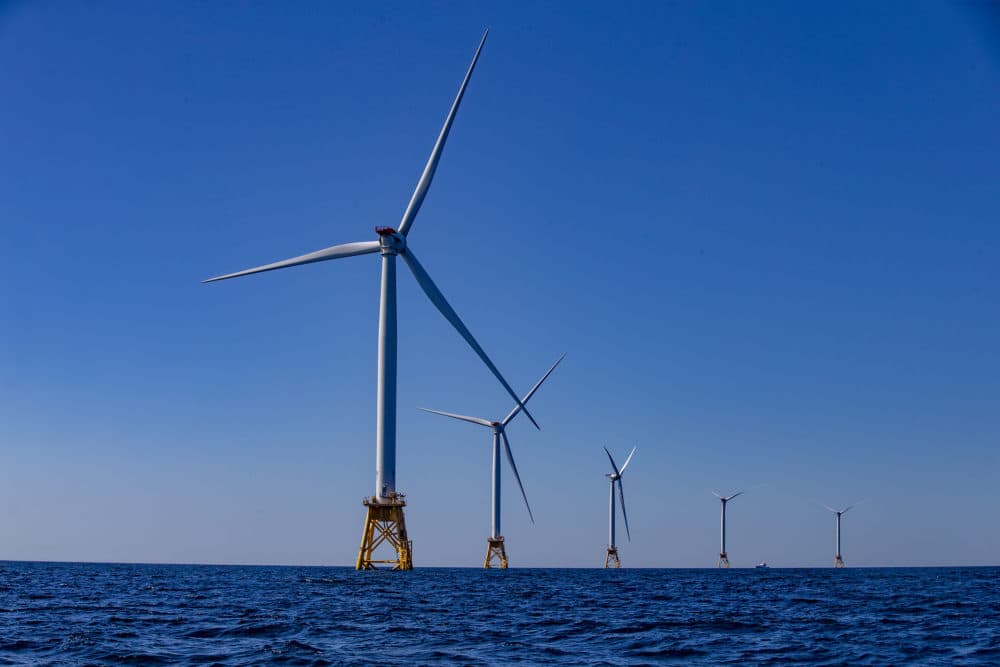Advertisement
In big day for offshore wind, Baker scraps price cap and seeks $750 million for clean energy fund

Gov. Charlie Baker announced sweeping legislation Wednesday to reshape the way Massachusetts procures offshore wind power, proposing to use $750 million in federal stimulus funds to establish a clean energy investment fund and jettisoning the requirement that each project carries a lower price than the one that came before it.
The clean energy investment fund Baker proposed at the kickoff of the American Clean Power Association's Offshore WINDPOWER Conference & Exhibition at the Omni Boston Seaport Hotel would be funded with American Rescue Plan Act money and represents "the single largest investment in the clean energy economy in Massachusetts to date," his office said.
The Massachusetts Clean Energy Center would administer the fund to provide support for the advancement of clean energy technology, help fund higher education efforts to develop and train the offshore wind workforce, support research and development efforts, and provide for "the long-term coexistence and sustainability of the fishing and clean energy industries," according to the administration.
The bill, which Baker said would be filed Wednesday, would also transfer the authority to select a winning offshore wind bid from the current setup in which executives from National Grid, Eversource and Unitil pick a winner with some state assistance to one under which the state's Department of Energy Resources would choose the successful projects with technical assistance from the utilities.
Massachusetts has about 1,600 MW of offshore wind power under contract between Vineyard Wind I and Mayflower Wind, and the most recent procurement round yielded proposals to develop as much as another 1,200 MW. To meet its climate goals, Massachusetts will have to get on pace of bringing about 1 gigawatt (or 1,000 MW) of offshore wind power online each year in the 2030s, the Baker administration has said.
"With this new legislation, as we look towards the next phase of our offshore wind strategy, we're ensuring that Massachusetts retains its leading-edge position in the offshore wind policy debate in the U.S. by proposing to, among other things, remove the price cap on project proposals to ensure that projects have the flexibility to incorporate storage, improved reliability and also greater economic development as part of their bids."
Massachusetts has so far put an emphasis on low costs in its offshore wind solicitations, but eliminating the price cap could signal that the priorities have shifted away from getting the cheapest possible power for ratepayers and in the direction of securing greater economic development and workforce commitments from the offshore wind industry.
And the idea to eliminate the offshore wind price cap puts the governor in alignment with House Speaker Ronald Mariano, who last month said the House is drafting its own bill to change what the state requires of developers that bid on future projects. But a key senator has been less than enthusiastic about the idea, potentially setting the issue up as a point of contention as the state continues its foray into the offshore wind world.
"The Legislature wrote this consumer protection language into the current version of the offshore wind statute. To be asked to remove it and just chuck it overboard is a big deal," Sen. Michael Barrett, the Senate co-chair of the Telecommunications, Utilities and Energy Committee, said. "You could make a case for letting the rate cap rise in a measured fashion in return for the kinds of concessions that the governor's people talk about — maybe there's a connection to storage, maybe there's some onshore transmission incentive that you would want to build into a calibrated rate increase. But to ask us to jettison it all together, the timing couldn't be worse."
Over the coming decades as Massachusetts seeks to achieve net-zero emissions, residents will be nudged towards replacing gas-powered vehicles with electric cars and swapping out oil heat for electric heat pumps, all of which will increase the overall amount of electricity consumed in Massachusetts. Already, the state has some of the highest electricity rates in the country.
Advertisement
"That's a potentially explosive combination, high per-unit costs and lots of units," Barrett said Wednesday. "I think this proposal of the governor's has to be weighed in that broader context."
Barrett said there are plenty of other parts of Baker's proposed bill that he thinks are good, workable ideas, like the investment fund and shifting authority to pick a winning project to DOER.
"But we could do all of that and still focus a very critical eye on removing all constraints on pricing. The rest of it could go forward — and maybe it should, maybe that's the right step here. I'm reserving judgment — but I hope that we think about the long-range strategy and whether we're putting a part of it at risk," he said.